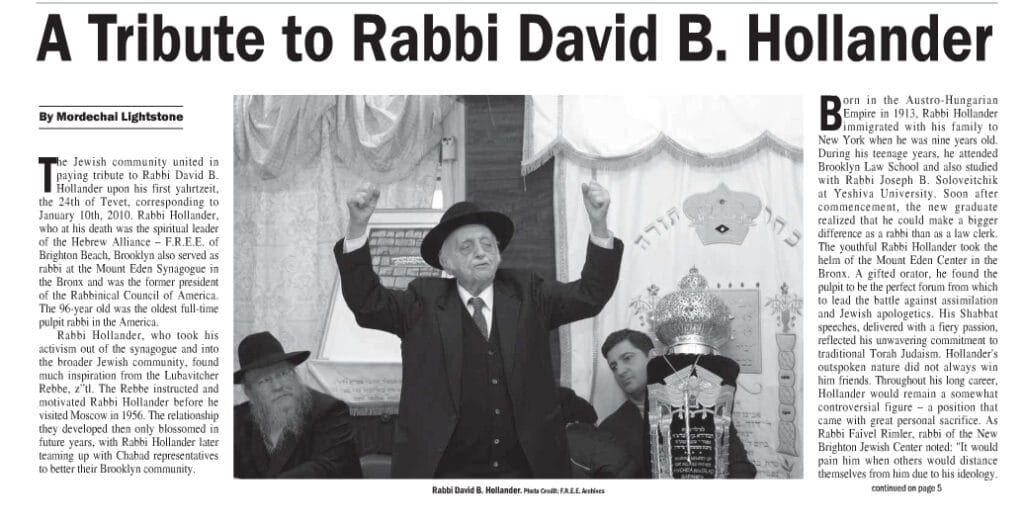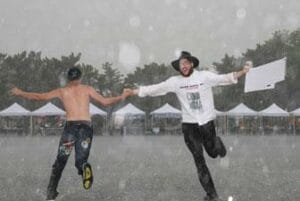The Jewish community united in paying tribute to Rabbi David B. Hollander upon his first yahrtzeit, the 24th of Teves, corresponding to January 10, 2010. Rabbi Hollander, who at his death was the spiritual leader of the Hebrew Alliance F.R.E.E. of Brighton Beach, Brooklyn also served as rabbi at the Mount Eden Synagogue in the Bronx and was the former president of the Rabbinical Council of America. The 96-year-old was the oldest full-time pulpit rabbi in America.
Born in the Austro-Hungarian Empire in 1913, Rabbi Hollander immigrated with his family to New York when he was nine years old. During his teenage years, he attended Brooklyn Law School and also studied with Rabbi Joseph B. Soloveitchik at Yeshiva University. Soon after commencement, the new graduate realized that he could make a bigger difference as a rabbi than as a law clerk.
The youthful Rabbi Hollander took the helm of the Mount Eden Center in the Bronx. A gifted orator, he found the pulpit to be the perfect forum from which to lead the battle against assimilation and Jewish apologetics. His Shabbos speeches, delivered with a fiery passion, reflected his unwavering commitment to traditional Torah Judaism.
Rabbi Hollander’s outspoken nature did not always win him friends. Throughout his long career, Rabbi Hollander would remain a somewhat controversial figure a position that came with great personal sacrifice. As Rabbi Faivel Rimler, rabbi of the New Brighton Jewish Center, noted, It would pain him when others would distance themselves from him due to his ideology. In the end, however, he always remained true to his beliefs.
His fight, Rabbi Hollander often noted, was an ideological battle against deception, not one against people. He saw no classes within Judaism, Mrs. Fay Hollander related to Lubavitch.com shortly before his funeral. To my husband there was only one Torah, and every Jew had a place in it.
Rabbi Hollander’s speeches and personality appealed to the broader rabbinic community. In 1954 he was elected president of the prestigious Rabbinical Council of America one of the world’s largest organizations of Orthodox rabbis. The position, which lasted two years, became a springboard for his pioneering work in aid of Soviet Jewry. It was to this end that he led a delegation of rabbis to Moscow in the summer of 1956. At the time, Jews in the Soviet Union still hid under the shadow of the Kremlin and the legacy of Stalin’s bitterly anti-Semitic policies. It was a testament to Rabbi Hollander’s tenacity that a rabbinic delegation was allowed to visit.
Before leaving for Moscow, Rabbi Hollander met with the Lubavitcher Rebbe, who led one of the only underground Jewish organizations in the country. The Rebbe served as a source of information and motivation to Rabbi Hollander. While in Russia, Rabbi Hollander met with Premier Khrushchev and several prominent Jewish leaders. He also printed 5,000 prayer books for Russian Jewry. Upon his return to America, he continued to devote himself to Russian Jewry and galvanized other leaders into action as well.
The relationship between the Rebbe and Rabbi Hollander blossomed in future years, with Rabbi Hollander later teaming up with Chabad representatives to better their Brooklyn community. In the 1980s, the Bronx Jewish community began to dwindle and give way to changing demographics. Rabbi Hollander, then 70, mentioned the idea of retirement to the Lubavitcher Rebbe. The Rebbe admonished Rabbi Hollander, drawing parallels to his own leadership of the Chabad movement and his decision to open 71 new institutions on his 70th birthday. I am older than you are and I take on additional burdens, said the Rebbe. By what right do you retire? The rabbinate is for life!
Rabbi Hollander became the rabbi of the Hebrew Alliance in Brighton Beach. Tapping into Brighton Beach’s growing Russian immigrant population, he partnered with the Friends of Refugees of Eastern Europe (known by the acronym F.R.E.E.) to initiate several education and social projects. The childless rabbi took a special interest in family celebrations, making special effort to attend circumcisions and bar mitzvahs. Even in his later years, Rabbi Hollander made the six-block trek to shul on a regular basis. When climbing to the second-floor sanctuary became too difficult for him, the congregation moved services to the main floor so that their beloved rabbi could lead.
Rabbi David Okunov, associate director of F.R.E.E. recalls a particular episode in Rabbi Hollander’s move from the Bronx. When the Mount Eden Synagogue was being dismantled, Rabbi Hollander transported the plaques commemorating deceased members to his new community. These aren’t just plaques, he stated, they are neshamos. These are people who need to be remembered!
Rabbi Hollander, who is survived by his wife of 61 years, Fay, was remembered by well over 1,000 people at his funeral. He was buried in Jerusalem.
Click here to read in Algemeiner






